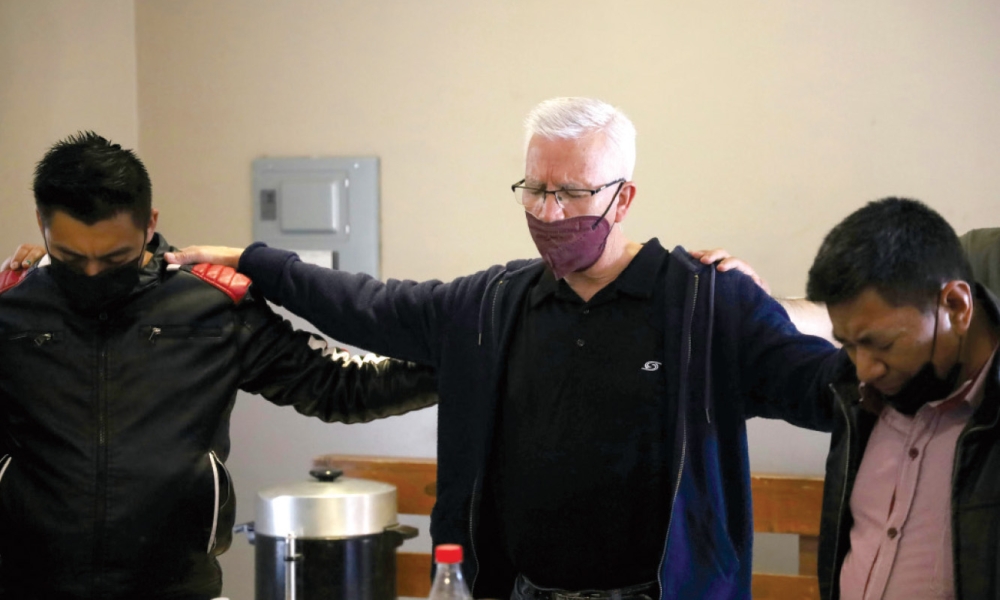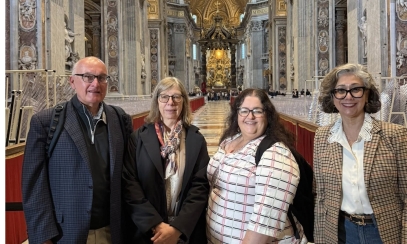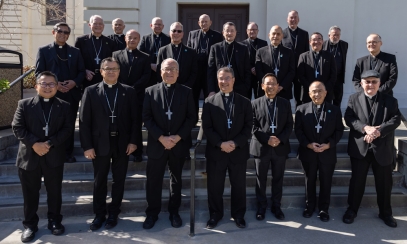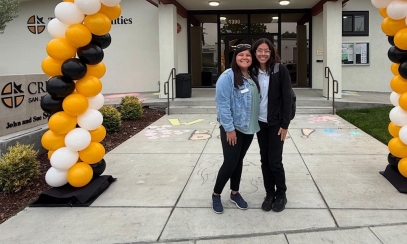
Forming Faith and Working for Justice in Small Groups
Kathy Mattingly, Donna O’Connell, and Carla Macchello
Kathy Mattingly, Donna O’Connell, and Carla Macchello
The Pastoral Plan for Formation (details found on pages 20-28 of this issue) hopes to encourage the role of small — anywhere from 6-15 people — faith-sharing groups within parishes who meet on site on a regular basis. Whether in person, online, or hybrid, the exact mode these groups will take remains to be seen.
The Pastoral Plan for Formation (details found on pages 20-28 of this issue) hopes to encourage the role of small — anywhere from 6-15 people — faith-sharing groups within parishes who meet on site on a regular basis. Whether in person, online, or hybrid, the exact mode these groups will take remains to be seen.
The Pastoral Plan for Formation (details found on pages 20-28 of this issue) hopes to encourage the role of small — anywhere from 6-15 people — faith-sharing groups within parishes who meet on site on a regular basis. Whether in person, online, or hybrid, the exact mode these groups will take remains to be seen.
For more sensitive topics, such as racial healing, which falls under the guidance of the Office of Life, Justice, and Peace, in-person meetings are preferred since they allow for the human element: tones of voice, more subdued expression, and the opportunity to empathize with others nearby.
In recent years, race is a topic that has become highly politicized, and it would take no small amount of courage to attend, let alone to lead, a small group on this topic. With the blessing of Fr. Angelbert Chikere, the diocesan Director of Life, Justice, and Peace, Kathy Mattingly, Donna O’Connell, and Carla Macchello are bringing Christian teaching on race, racial healing, and reconciliation, as it is rooted in their Catholic faith, to a small in-person group at St. Clare, as well as a larger group that meets virtually. It is not an endeavor for the faint of heart.
Not a virtue-signaling group
Of the three leaders, Carla is the most recent addition to the group. “I am brand new to Just Faith Ministries programs, which operate in small groups. I also recently helped start The Land is Not Our Own: Seeking Repair Alongside Indigenous Communities.” Before this, she was involved with small groups of Companions in Ignatian Service and Spirituality for years.
Carla shared that leading and participating in a social justice-focused group is a transformative process for her. In other words, she does not seek to talk down to participants or for it to become a chance for virtue signaling. Instead, she is also personally seeking to be formed in empathy and justice and in working for healing. She explained what it means to her to lead. “This changes us. Our group offers a safe space to learn, reflect, pray, and point ourselves toward being good allies. It helps us to put our faith into practice.”
The leader is the first one formed
Carla’s other partners, Donna and Kathy, have been involved in small group ministry for several years. For Donna, co-facilitating small groups utilizing a Just Faith Ministries program did not begin until 2021. In contrast, Kathy has been involved in small group formation and leadership since before the inauguration of the Diocese of San José in 1981. She and Donna began offering small groups focused on social topics, the most challenging of which, at least from a pastoral perspective, concerns race and repairing relations with Native Americans.
Part of Kathy's attraction to this topic stems from her background as a Southerner. She grew up in the Jim Crow South, and the God she discovered in the Catechism did not compute with racial segregation and the expectation that ‘negroes’ ought to stay ‘in their place.’ With the George Floyd tragedy, she realized that it had been decades since she had been involved in civil rights. She later discovered and completed the Just Faith Ministries series on Catholic Social Teaching (CST).
Likewise, Donna has also completed the course on CST, but afterward, like Kathy, she found herself longing to keep the experience going by continuing the conversation. “What I read about Catholic Social Teachings was transformative, but I wanted it to be more than something I simply read about. Co-facilitating courses on racial equity, racial healing, and racial justice has helped me begin to understand the plight of real-life people of color as being embedded systemically in our institutions.” She later discovered that her experience leading as Christ did transformed her relationship with Christ. “It has deepened my understanding of Jesus’ ministry — a ministry that restored dignity to marginalized individuals, thereby restoring them to the community.”
The Meet-up
Kathy and Donna and four other participants met in a classroom at St. Clare. A few desks were arranged in a circle, showing that all were equal in the discussion, even the facilitators. The group began with prayer for racial healing, followed by a reflection on which aspects of the prayer stood out and why.
A scripture meditation from Exodus followed. As this session focused on slavery and the Middle Passage (the name given to trans-Atlantic slave ship routes), the reading was God’s promise to free His enslaved people from Egypt. An audio recording of the southern Black spiritual “Go Down Moses” was played, and participants shared selections from the books that the group is reading together.
What followed was a challenging and cleansing discussion on how racial healing goes both ways: for those who are victims of racism and for those just coming to terms with their complicity in racial discrimination. For this small group's demographic, most reported the latter as the reason they came. They admitted that they had never learned about the Middle Passage in school and discovered certain racial biases in themselves or in their upbringings over time.
One participant said it best, “This group has given me a safe space to talk about my racism in a safe setting with no judgment. I am working up to trying to speak with some friends about their racist tendencies, and this group is helping me do that.” Another participant gave an example of what her racism looked like. “I began to notice that when a non-white person was walking in my neighborhood, I would automatically be suspicious.”
This honest, heartfelt exchange is the most essential part of the group dynamic for Donna and Kathy. “The most important thing is the conversation and the community formed,” were sentiments echoed by both. Another way of putting this, perhaps, is through conversation, the community is healed. This is the potential power of the small faith-sharing group: it may be the spark for more widespread reconciliation amongst all peoples, one conversion at a time. In Carla’s words, “Small groups offer opportunities to look at difficult topics in a supportive environment, where our hearts can be softened and opened to painful truths.”
Called to action
Carla shared where she saw the role of faith-sharing groups in the greater Church. “I see small group formation having an immeasurable potential in connecting people on a common path, both spiritually and toward action. Built into the structure of our Just Faith bi-weekly meetings is a section, ‘Now what?’ where we can think and brainstorm together on what we might do with the information we have just absorbed.”
All Just Faith Ministries programs culminate with a ‘call to action.' At the end of their meeting, each participant, even the virtual attendee, Judy, chose a local organization already working in the community for racial healing. Kathy also commented, “I recognize small groups as the ideal medium for all the activities and experiences that help to form missionary disciples, people who have a personal relationship with Christ nurtured through the Eucharist, who bring God’s love and mercy to others.” Perhaps in this political climate of division, it would be good if all Catholics considered joining or even starting a small faith-sharing group to continue their and their community’s personal and spiritual formation. MN
Carla Macchello is a retired adult education teacher of English as a Second Language and high school equivalency. She is currently a volunteer adult literacy tutor. She is married with a 31-year-old son and is a member of St. Simon Parish, where she is also on the Green Team and a member of the diocesan Stewards of Our Common Home Committee.
Donna is a former first-grade teacher. Post-retirement, she has tutored for Reading Partners in downtown and East San José. She is also a member of the Companions in Ignatian Service and Spirituality.
Kathy has served as a lector, CCD teacher, RCIA team member, pastoral council member, and as a leader of discussion groups at St. Lucy and St. Thomas of Canterbury for decades. She holds a master’s degree in Pastoral Ministry from Santa Clara University.



